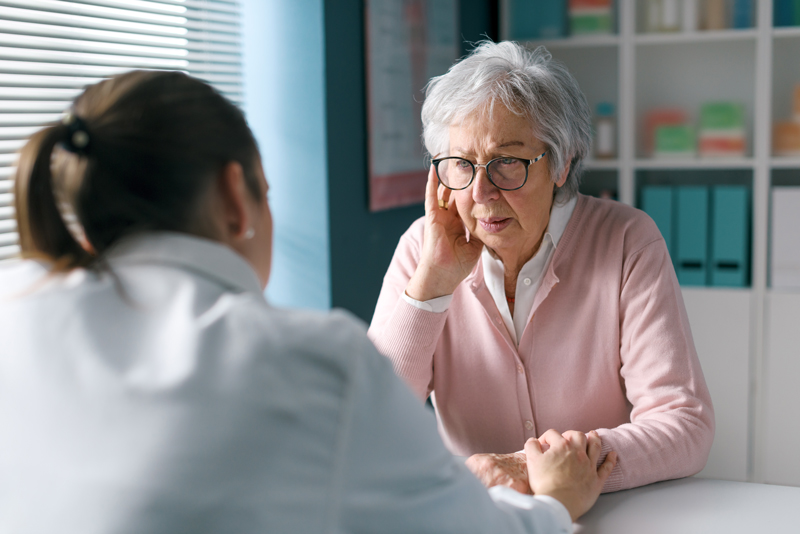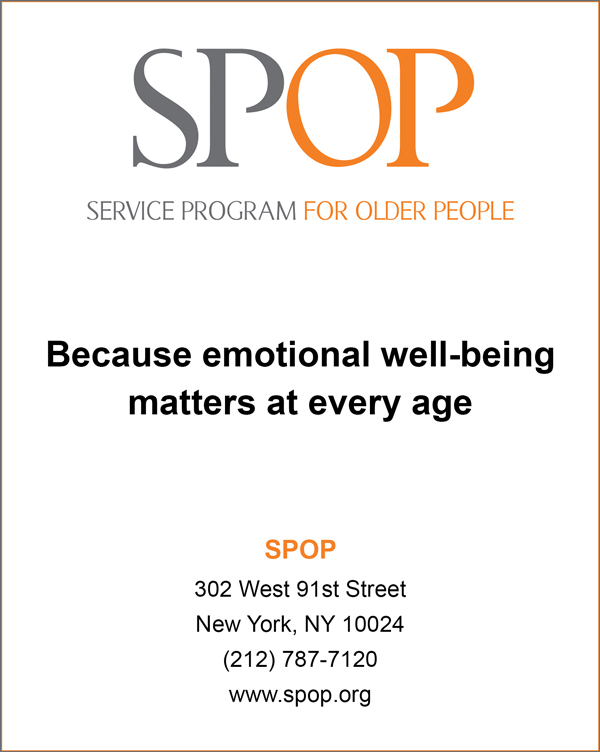Anxiety and depressive disorders are the most common mental health conditions experienced by older adults. The World Health Organization estimates that up to 20% of people aged 60 and older live with anxiety or depression, a number I expect may be a good bit higher given that older adults are routinely under-screened and under-diagnosed.

At Service Program for Older People (SPOP), we recognize the challenges of treating anxiety and depression in older adults who span multiple generations, hold diverse cultural beliefs about mental health, and have varied access to treatment resources. What older adult cohorts have in common, however, is a greater likelihood that their symptoms may be exacerbated by such factors as isolation, unresolved grief, caregiver distress, or chronic pain. We have learned that client outcomes are often improved when we recognize this challenge and provide treatment that includes increased contact, intervention repetition, and acquisition of coping skills.
Located in New York City, SPOP is one of a handful of agencies across the country that focus entirely on community-based mental healthcare for older adults. We work in partnership with hospitals and aging services providers to reach out to the most vulnerable, with a goal to improve the quality of life of older adults by offering age-affirming behavioral healthcare and linkages to aging support services. Our clinical programs serve 1,000 clients each year, over 70% of whom have anxiety or depressive disorders, often occurring comorbidly.
We recently developed an Enhanced Care treatment model for those clients who are at elevated risk of decompensation and have a need for repetitive, supportive contact. This model has been especially effective for older adults who live or care-give in isolation or have significant difficulty with self-regulation and coping. For these clients, a panic attack or bout of despair can lead to severe deterioration of activities of daily life, such as bathing, eating and obtaining medical care or, in other cases, to suicidality and violent fantasy.
Enhanced Care offers time-limited services (six to eight weeks) provided in concert with the client’s primary therapy, with a goal to stabilize symptoms and improve functioning. In addition to insight-oriented psychotherapy, the client meets with a secondary clinician to build affect regulation and symptoms management skills and is encouraged to participate in a Dialectical Behavior Therapy (DBT) group to practice these skills with their peers. Clients also receive a weekly check-in call from a social work intern to mitigate the impacts of isolation and to assess for any changes in safety or mental health needs. Clients report that Enhanced Care not only teaches them how to “live” but how to “live with themselves” using digestible, concrete interventions.
This client story shows how our staff are using Enhanced Care interventions to treat anxiety and depression in older adults.
“Donna” is an 81-year-old female client, initially referred to SPOP to treat depression, secondary to caregiving for her husband who was physically declining. She evidenced irritability, tearfulness, and dysphoria, and she admitted to a passive wish that she and her husband would die. She reported that she was unable to take care of either herself or her husband’s physical or emotional needs and felt overwhelmed to the point of despair. Donna expressed guilt and horror at the intensity of her rage toward her husband and the irony of wanting to isolate from him while already feeling so alone.
Donna met with a primary clinician who provided psycho education on caregiver distress and helped her identify the underlying factors of depression that had been present but unaddressed for many years. She also with a secondary clinician who taught her regulative breathing techniques, progressive muscle relaxation, and use of sensory changes to ground herself in the present. She joined the DBT skills group and was pleasantly surprised to meet other older adults who struggled with suicidal and violent thoughts towards others. This helped to normalize parts of her experience which had initially made her afraid of herself. She learned through the group how to reduce the power of her thoughts and build stamina for intense emotions.
Donna also appreciated the check-in call with her assigned social work intern. She initially regarded it as a mandatory courtesy call but quickly understood that the call provided valuable reassurance – and was often the only phone call she received over a period of days. This realization underscored the intensity of her isolation and became fodder for her aftercare plans to build social relationships with other caregivers.
After eight weeks of Enhanced Care support, Donna reported that she was managing her moods and symptoms with much greater ease. She obtained several hours of home care for her husband and used her new skills to communicate with him more effectively. She reported that she no longer had suicidal ideation or violent fantasies. She also expressed willingness to start taking an anti-depressant, which was a type of assistance she had not previously been open to. She continues to meet with her primary clinician, who helps her further understand her depression, her sense of self, and how to build social support.
In an underfunded healthcare landscape of aging and mental health services, we are always looking for ways to do more with less. How can we help clients who just need “more”? Enhanced Care is a strategy that has enabled SPOP to re-resource existing service provision to temporarily target client needs. It creates routine and essential therapeutic redundancy and sets the stage for success long after the interventions have been implemented. Most important, it provides the support, skills, and resources to improve the quality of life of older adults.
Catherine Thurston, LCSW, has served as Chief Executive Officer of Service Program for Older People (SPOP) since 2024, having previously served as Chief Program Officer. She has over 35 years of experience in gerontological social work. She has been a member of the Adjunct Faculty at the Silberman School of Social Work at Hunter College since 2016. She received her Master of Social Work from Hunter College School of Social Work.





